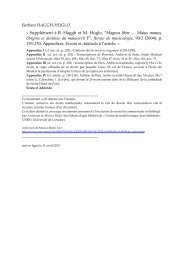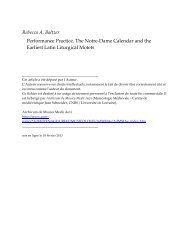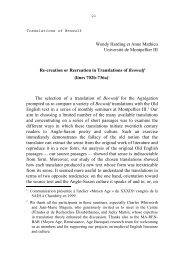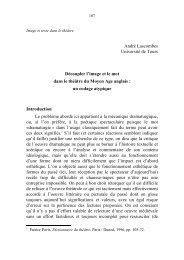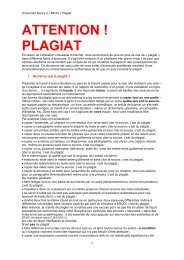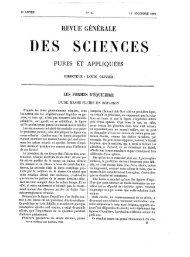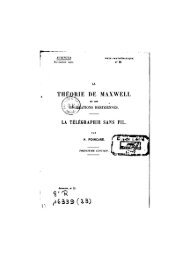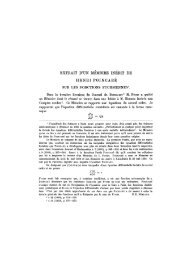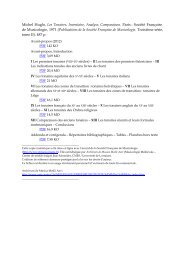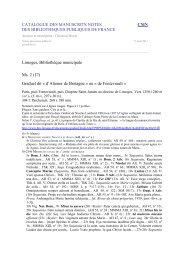You also want an ePaper? Increase the reach of your titles
YUMPU automatically turns print PDFs into web optimized ePapers that Google loves.
144_(12U<br />
Maria K. Greenwood<br />
in the present and vouches for the past. Stories on the other hand tell<br />
of the past; the story-teller speaks of people other than himself and<br />
relays what they told him about themselves or about others, so that<br />
stories depend on hearsay as much as on experience. 3 In the<br />
pilgrimage story frame, the "General Prologue" and the link-passages<br />
between the tales, Chaucer's Narrator, before going on to the more<br />
obviously marvellous (fictitious) stories told by the various pilgrims,<br />
claims to speak from his own experience and to tell the simple truth.<br />
He then creates the pilgrim characters as realistic persons who may or<br />
may not themselves be telling the truth, but be fabulating,<br />
exaggerating or even lying in specific ways.<br />
The passage from the realism of the "General Prologue" to the<br />
fantasy of the tales is effected chiefly by the use of tenses. Indeed, the<br />
English system of tenses allows Chaucer to make the sort of<br />
characterization of his pilgrims that everyone necessarily makes of<br />
others in real life. References in Chaucer's text to real, ie datable time,<br />
create the illusion of real-life talk, whereas the lack of such references<br />
and the use of conventional literary formulae immerse<br />
listeners / readers in the immeasurable time of imagined story. In the<br />
portraits of the characters in the "General Prologue" datable and<br />
undatable notions of time mingle as they evidently always do in<br />
literature and even in actual living.<br />
Focussing on the subject of time in literary texts (as treated by<br />
such critics as Robert Myles, Umberto Eco, Mikhail Bakhtin), 4<br />
3 . The discussion of "authority versus experience" runs through the corpus of<br />
Chaucerian criticism, but by describing "authority" as "hearsay" we attempt to<br />
divest the term of its in-built reverence. See Larry Scanlon, Narrative,<br />
Authority and Power: The Medieval Exemplum and the Chaucerian Tradition,<br />
Cambridge: Cambridge University Press, 1994.<br />
4 . Umberto Eco, Six Promenades dans les bois du roman et ailleurs, trans. into<br />
French by Myriam Bouzaher, Paris: Bernard Grasset, 1996, re-edition of<br />
original English, Six Walks in the Fictional Woods, Cambridge, Ma.: Harvard<br />
University Press, 1994 ; Robert Myles, Chaucer's Realism, Cambridge:<br />
D.S. Brewer, 1994 ; Michael Holquist, Dialogism: Bakhtin, and his World,<br />
London and New York: Routledge, 1990.



